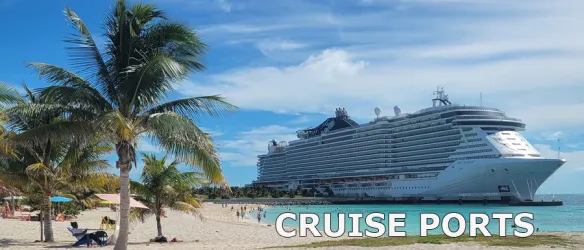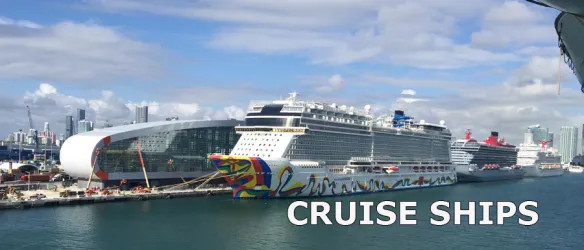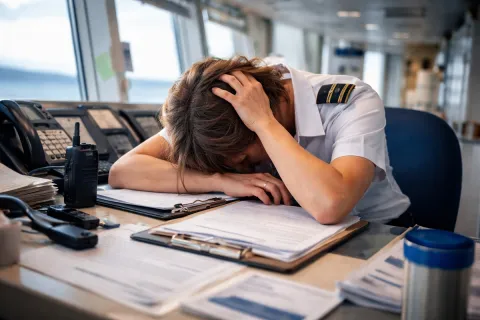
Through out our human history, people have expressed their interests and concerns to their employers, but thought the history of the cruise industry this has not been such an often occurrence for many reasons.
First most common reason why crew members normally do not strike is because they are most often hired from countries in development where they make just a fraction of what they would make aboard a cruise ship. On one side the companies are getting affordable labor, on the other side employees from developing countries can make a lot more for a shorter amount of time.
Second most common reason may be that employees on ships work so many hours and are constantly on the open sea that they either do not have time to research the Labor Laws of the country in which the ship is registered, or that they do not have the means to petition for a license to legally protest.
Taking the previous in consideration, we came across the event which occurred on the P&O Arcadia on May 10, 2011 when 150 Indian crew members decided to peacefully protest due to insufficient incomes. We are all aware that crew members who work in restaurants largely depend on the tips from their guests. In the P&O Arcadia the crew members earnings depend greatly on the tips from their guests. Unfortunately, before the event on May 10, 2011, the tips of the employed personnel in the restaurant department aboard the ship Arcadia has dropped significantly leaving the employed crew members – who sacrifice their time with friends and family in order to work on the cruise ships – nothing more than to express their concerns to the company. Promises have been made to amend this problem, but the process seemed slow for the people who were depending greatly on those promises.
While in the port of Seattle, 150 Indian crew members decided to protest the slow process of mending the problem of their livelihood. Even though the 90 minute protest inconvenienced some guest, it was still peaceful without any problems. Once the protest was finished, the crew went on with their daily duties as usual. The captain aboard the Arcadia promised the crew members who protested that no disciplinary actions would be performed for their misconduct. While still on their ongoing contracts, none of the crew experienced disciplinary actions for the protest; once the contracts were done, the crew members who protested were not offered a new contract letter to return to work aboard any of the P&O cruise ships. Due to this, 150 families are lacking an income and 150 crew members have lost careers to which they have been so much depended.
The P&O explained their action towards the 150 crew members as justifiable due to the sole reason that the crew members did not present any official notice where and when the protest would take place, or that it would occur at all. Even though all those crew members lost their livelihood, P&O played their cards right by keeping the captain's promise not to reprimand the crew members for their misconduct and allowed them to finish off their contracts to the very end, thus termination did not take place.
Now, lets take this event in consideration and advise crew members who wish to change something in one cruise company. Most of the cruise companies are not registered in places such as the States or UK. Most often, the choice falls on Panama, Bermuda, Belize, and so on. The cruise companies make such decisions due to the fact that Labor Laws in these countries are not as strict as in the States and the UK, as well as rates for wages for crew members salaries go along with accordance of the rates which are legal in the country of registration. Most countries in the world have “The Right to Strike,” or “The Right to Assemble.” This applies with the cruise ships as well since they should abide by the Labor Laws of the country in which they are registered. Every country has a certain protocol to which employees should abide to as well. Both Bermuda and Panama allow peaceful assemblies, protests, and strikes, but there is a process such as mediating with the employer, petitioning for a license to protest at certain time and place, as well as offer the employer notification of the same.
In the case of the 150 crew members, P&O representatives state that they did not receive any kind of notification, thus giving a just cause to present each employee with warning for misconduct. If the employees assembled in their own free time it would not constitute misconduct, strike, or protest, just a peaceful assembly, thus not presenting as an easy just cause for the employer to terminate any future working relations with its employees. Under the Labor Law of both Panama and Bermuda, people do hold the right to peaceful assemblies in order to express their right to freedom of speech and expression of interests, as well as concerns without the requirement of a license. The license for strike and protest is issued in order to help any potential inconvenience due to the stoppage of work.
The question is “did P&O terminate the 150 crew members, or not?"
Well, not really. Working on a cruise ship is contracted employment, or in other words termination may occur only when that 6-9 months contract has been interrupted due to the desire of the employer. Once the contract expires, it is up to the employers discretion of whether or not another contract would be offered. In the case of the 150 crew members of the Arcadia, termination did not occur since P&O allowed them to finish their contracts to the very end. They do hold the right not to offer another contract due to a misconduct or lack of performance.
So what is a crew member to do?
Simple, make sure when met with such unsatisfactory situation of material and environmental means that the majority of the crew is involved. Once the crew members express their concerns to the employer, they should give them time to work out some kind of remedy. If the solution is taking too long, the crew members should write the employer a dead line. Meanwhile, crew members should petition the country in which the ship is registered for license to strike and protest, as well as the time and place of the same, meaning the dead line given to the employer. If the employer has not remedied the problem even by then, the crew members do hold the right to protest once presented with a green light from the Ministry of Labor from the country in which the ship is registered. It is always great to have a lawyer at this point who will represent the majority of the crew and protect their rights.
Does this process save you from being marked as a problem crew member who will not receive an employment letter once again?
Not really. Remember that crew members work on contract based employment and their employment is limited to that period stated on every newly presented offer letter. This is where a majority is beneficial, as well as a lawyer. It is not that hard to replace 150 people, especially if those 150 people have a long way to go on their contract, such as 2-4 months. This gives the company enough time to recruit new crew members, thus not put the operation of the ship in jeopardy. If the majority of the crew has only few weeks left on the contract might mean a different story. Number does play a lot as well. If one ship has 1000 crew members and 600 of those protest legally towards the end of their contract would be harder to replace in such a short amount of time. If this occurs on all ships at the same time it would be impossible.
When it comes to a lawyer on hand, he or she would make sure that the proper documentation is ready to go for a legal protest, as well as if the employer wishes to reprimand crew members for expressing their right to protest and so on. Remember, every crew member has certain rights which the employer has to honor and a lawyer usually has the knowledge of what the crew members can do and how.
If you strike there is 100% certainty you will be fired! That is the ugly truth
Crew Insights
Articles and experiences shared by crew members working on cruise ship. Find out more about ship life at sea together with tips and advices for first time crew members and cruise oldtimers.












